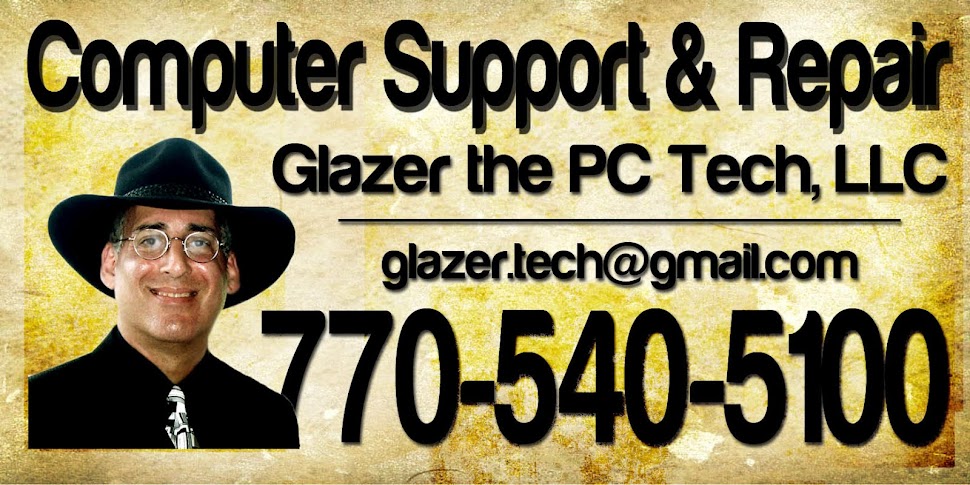
Computer Care: Destroy data on old PC or it could come back to bite you
By Arthur Glazer
arthur@glazerthepctech.com
POSTED: March 19, 2011 9:27 a.m.
You have an old computer that you want to give away or throw out. Perhaps you found a gem of a PC at a yard sale. Either way, the issue to consider is the data on the hard drive.
If you were discarding a computer, your old data should be deleted prior to giving it away. If you were to be the receiver of one, the data should still be deleted. Either way, the existing data is sensitive and in need of erasure.
Even if the computer in question doesn't work and there is hard-drive failure, the data remains.
So what, you think? Think again.
It may not be government secrets, but you have address books, phone numbers, Social Security numbers, banking information (including credit card and account numbers), business e-mails, letters to your loved ones, family photos and perhaps a personal journal.
You wouldn't want any of that information to fall into the wrong hands.
What about a used PC you just came upon? What if there are viruses, malware, porn or those government secrets on it? You don't want any of that on your new-found computer.
So how do you clean your hard drive? There are various methods. First let me say that deleting files does not truly delete them.
A client of mine once mentioned that she cleaned up her system by deleting desktop icons, thinking she deleted the programs. She did not. All she got was a tidy desktop. The applications remained.
Even if she had deleted the associated files, they would still, in a sense be there. By deleting folders and files, you simply remove the reference to them, their names. It's telling the system that the space used by that old file may now be used by something else. Until it is overwritten, the old file remains. Someone like me, with the proper utility, could still find the files after you delete them.
You could format the hard drive or reinstall Windows, which also includes a reformat, but the old files are still there, beneath the new copy of your operating system.
In most cases, unless you really have something to hide, this should suffice.
If you really want a secure wipe of your system, you need a comprehensive utility to accomplish that task. There are of course, programs you could purchase, but there are also good free ones.
DBAN, Darik's Boot and Nuke, doesn't have the smoothest interface, but it gets the job done. It can be run from a CD or a USB flash drive and comprehensively wipes your drive clean.
There are various methods to wiping the hard drive, from one pass across the disk to many, each writing random zeros and ones across it, rendering the old data unreadable. A common wipe known as the DOD (Department of Defense) wipe, uses three passes. The more passes, the more secure it becomes.
Another free utility is Eraser. The difference from it and DBAN is that you can specifically pick which files you want to erase with this, instead of wiping the entire hard drive. You can delete files, but leave the operating system intact.
There is also the option of destroying the hard drive, as opposed to just deleting its files. Whatever you can safely do to stop the drive from spinning will render it unreadable. Drilling a few well-placed holes through the drive or banging some nails completely through it does the trick.
Contrary to popular belief, household magnets do nothing to disrupt the data on the drive. The magnets that are used in a drive (neodymium or rare earth type) are much stronger than anything you'll find in your tool box.
There is a process known as degaussing that uses those special magnets. It's an effective procedure, but an expensive alternative.
There are some ways that should not be used to destroy data on a hard drive. Nuking it the microwave, soaking it with acid or using it for target practice may work, but are extremely dangerous methods for obvious reasons.
Alternatively, before giving away your computer you can remove the hard drive. There are only four screws and a couple of cables. Then you can decide if you want to reuse the drive or delete the data.
I have been asked by clients if they need to remove the RAM (system memory) before giving away a computer. RAM is only temporary storage in a computer. Once the system is powered down, all that was stored in memory is lost. RAM need not be removed, unless you want to reuse it in another system.
A hard drive, on the other hand, is permanent storage. The data is written to disk. It will remain intact until overwritten or deleted.
Whether you're on the giving or receiving end of recycled equipment, it should be imperative that you remove existing data from the hard drive, one way or another.
If you don't, it may come back to bite you.
Arthur Glazer is a freelance writer and computer technician in Gainesville. His column appears biweekly on the Business page and on gainesvilletimes.com.

